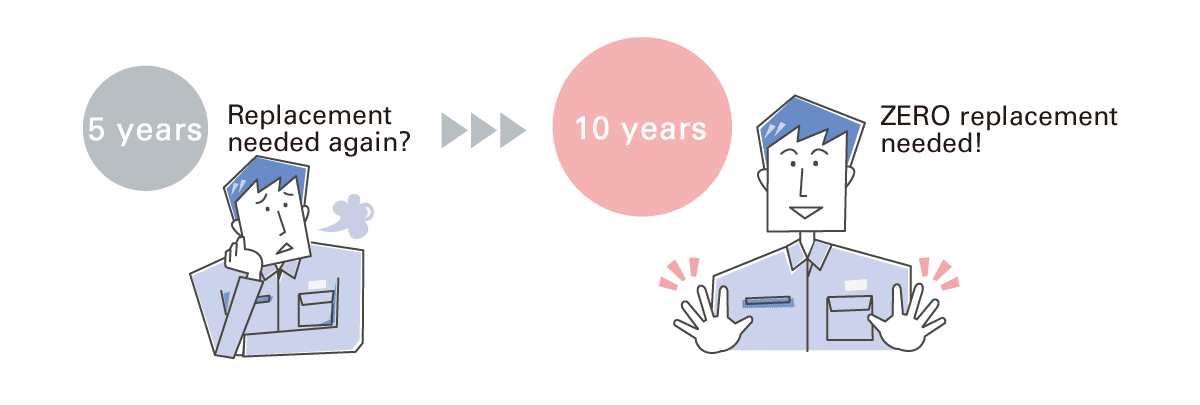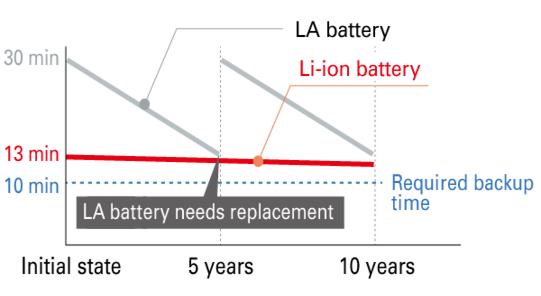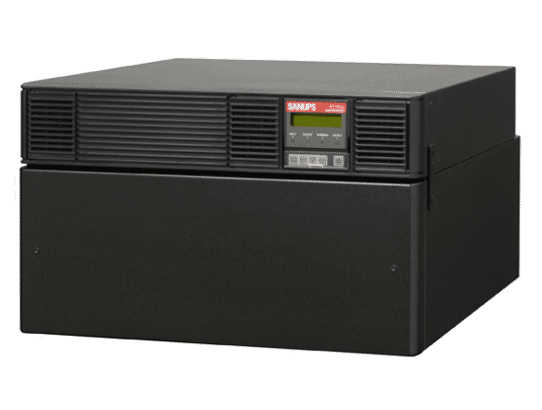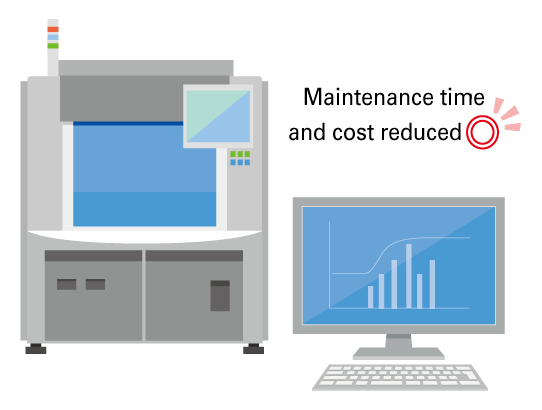



-
- Free Word Search




Lithium-ion batteries, which have come to be used in UPS in recent years, have attracted attention because they have a variety of advantages over conventional lead batteries.
However, we hear from customers that, "I understand that the battery life is long, but isn't it still expensive in the end?"
What is the truth? In this article, we will introduce the features of lithium-ion batteries and the reasons why they are actually a great deal of savings in both cost and effort.
Lithium-ion batteries have been rapidly adopted in various industries in recent years. What are their advantages? We will introduce them and compare them with the lead batteries that have traditionally been used in UPS.
The lifespan of a lead battery is generally said to be "2 to 5 years"*1, while the lifespan of a lithium-ion battery is said to be about "10 years"*2. Since 10 years is equivalent to the expected lifespan of the UPS itself *2, it has the advantage that you can reach the time to replace the equipment without ever having to replace the battery. On the other hand, lead batteries require battery replacement once or twice.
*1 When the ambient temperature is 25°C.
*2 For SANUPS A11K series.

Lithium-ion batteries have the advantage of being extremely small and lightweight. This allows the UPS unit that uses the batteries to be extremely small and lightweight. Some models can be made smaller to about half the volume *3 than lead-acid battery UPS, while others can be made about 40% lighter, or 30kg lighter *3.
I don't want this item to take up much space if possible, so it's nice that it can be made smaller.
*3 Varies depending on capacity and backup time. Please contact us for details.
![Volume/Capacity Comparison [Lead UPS - Lithium-ion UPS]](https://data.wovn.io/ImageValue/production/660a0f3eff2fba0083c85498/en/9b88433abf906cf9713172c94b05585a/case_img_132_capture_2.png) ▲Comparison of volume and capacity [Lead UPS - Lithium-ion UPS]
▲Comparison of volume and capacity [Lead UPS - Lithium-ion UPS]
Lithium-ion battery UPS has the above advantages over lead batteries, but we often hear from customers that "cheap lead batteries are good enough."
So, from now on, we at SANYO DENKI are confident that "lithium ion batteries reduce total costs and hassle, and are a better deal overall!" and we will explain three reasons why.
As shown in the battery life comparison, the lifespan of a lithium-ion battery is 10 years, which is the same as the lifespan of the UPS itself, while the lifespan of a lead battery is about 2 to 5 years. This means that you will need to replace the battery once or twice between the time you purchase the UPS and when it is time to replace it.
The cost of this is not just the cost of the battery itself, but also the cost of the replacement labor. When you consider the cost of the replacement battery and the labor costs, in many cases the total cost of a lithium-ion battery UPS is cheaper.
*1 When the ambient temperature is 25°C.

Replacing a UPS battery not only costs money but also takes time.
The hassle of battery replacement goes beyond just making inquiries and selecting the right battery. When replacing the battery, careful consideration must be given to the surrounding equipment that will be affected when the UPS is turned off, and this may require fees to an external company. *4 With lithium-ion batteries, there is no need to replace the battery, so you can use your UPS with peace of mind without the hassle.
Ideally, you'd like to avoid the hassle and expense of never having to replace the battery before replacing your UPS.
In addition, as shown in the comparison of UPS size and equipment mass, lithium-ion battery UPS are smaller in size and mass, which also reduces the amount of work required when installing the UPS.
*4 The hot swap function also allows you to replace the battery without stopping the load.



The difference in battery life not only reduces replacement costs, but also brings about another major cost benefit that is surprisingly little known: lithium-ion batteries allow you to choose a UPS with a shorter backup time.
In fact, one of the characteristics of lead-acid batteries is that they deteriorate over time, causing a decrease in capacity. This decrease in capacity means that the time the battery can supply power to load devices during a power outage, in other words, the battery's retention time, decreases over time.
Let us take as an example a case where a 10 minute backup time is required to automatically shut down a load device (800W).
In the case of a lead-acid battery UPS, because deterioration over time reduces the backup time to less than half after five years, which is the end of the battery's lifespan, it is necessary to select an "initial 30-minute product."
Furthermore, the battery will need to be replaced before the device reaches its end of life.
On the other hand, in the case of a lithium-ion battery UPS, more than 80% of the initial backup time can be maintained even after 10 years *5. Therefore, if you select an "initial 13-minute product," you will be able to maintain 10 minutes of backup time even after 10 years of the equipment's lifespan.
There are some models *6 where the lithium-ion battery UPS with an initial rating of 13 minutes is cheaper than the lead battery UPS with an initial rating of 30 minutes, so the lithium-ion battery UPS is also more cost-effective in terms of initial costs.
*5 When the ambient temperature is 25°C (average) and the battery is discharged an average of 10 times per year, the backup time after 10 years will be maintained at approximately 80% of the initial time.
*6 Comparison between our A11K 1kVA lead-acid battery UPS and lithium-ion battery UPS.
Taking these points into consideration, even though you may think that a lithium-ion battery UPS is expensive, in many cases it will actually cost less than lead batteries.
| product | Model price | Replacement battery cost | exchange Operation cost |
Clearing work The hassle |
| Lead-acid battery | The initial backup time is A UPS with twice the required capacity is required. |
Required once or twice | Required once or twice | Required once or twice |
| lithium ion battery |
The default backup time is Required value + α is OK |
no need | no need | no need |
We have a lineup of several lithium-ion battery UPS models. This time, we will introduce the features and lineup of the "SANUPS A11K-Li," which is one of our recommended models.


Automotive parts manufacturer A (Number of employees: 5,000)


Company A is an automobile parts manufacturer. The company has introduced UPS to back up the inspection equipment in the factory. In the event of a power outage, the UPS required a backup time of 10 minutes to safely save data and shut down the system.
Mr. Y, the factory manager, talks about his concerns at the time:
"The factory operates 24 hours a day, 365 days a year, so it is absolutely impossible for the inspection equipment to be stopped. When replacing the UPS batteries, we switch to bypass power supply, but if there is a power outage at that time, the inspection equipment will also stop. To eliminate that risk, we wanted to avoid battery replacement altogether if possible. We knew that lithium-ion UPS batteries had a long life, but they were expensive and we couldn't afford them.
After hearing about the cost issues, a sales representative from SANYO DENKI made the following suggestion:
"Lithium-ion battery UPS are perceived as being expensive, but when you consider the cost of battery replacement and the need to reduce backup time when selecting a model, they're not necessarily so expensive."
Mr. Y became interested in the story and asked for more details. He describes that experience as follows:
"I could imagine reducing battery replacement costs, but I was very surprised by the backup time. I needed a backup time of 10 minutes, but I realized that I had been choosing a model with an initial value of 30 minutes, anticipating deterioration over time. However, with a lithium-ion UPS, 13 minutes is sufficient *7, so when I estimated the cost of the model, the lithium-ion UPS turned out to be cheaper." (Mr. Y)


Mr. Y began to seriously consider the introduction of the system, and soon after introduced the UPS `` SANUPS A11K-Li.''
"Not only did it solve my initial concern of reducing the number of battery changes, but it also reduced the cost of the initial model and the cost of battery changes, so it killed three birds with one stone. I'm really satisfied." (Mr. Y)
*7 When the ambient temperature is 25°C (average) and the battery is discharged an average of 10 times per year, the backup time after 10 years will be maintained at approximately 80% of the initial time.
Supervisor: SANYO DENKI CO., LTD. Sales Headquarters Power Systems Business Group
Update date: /release date: